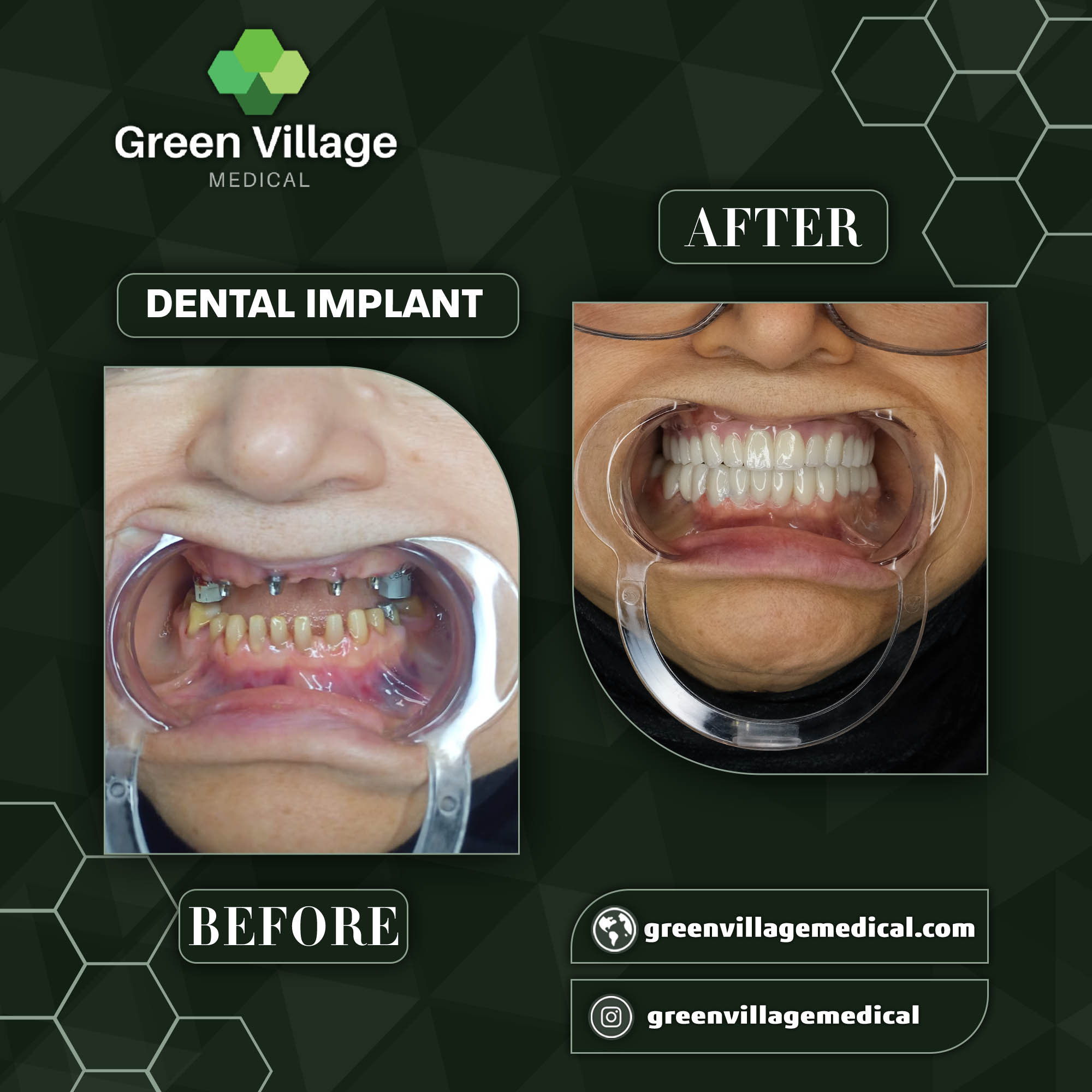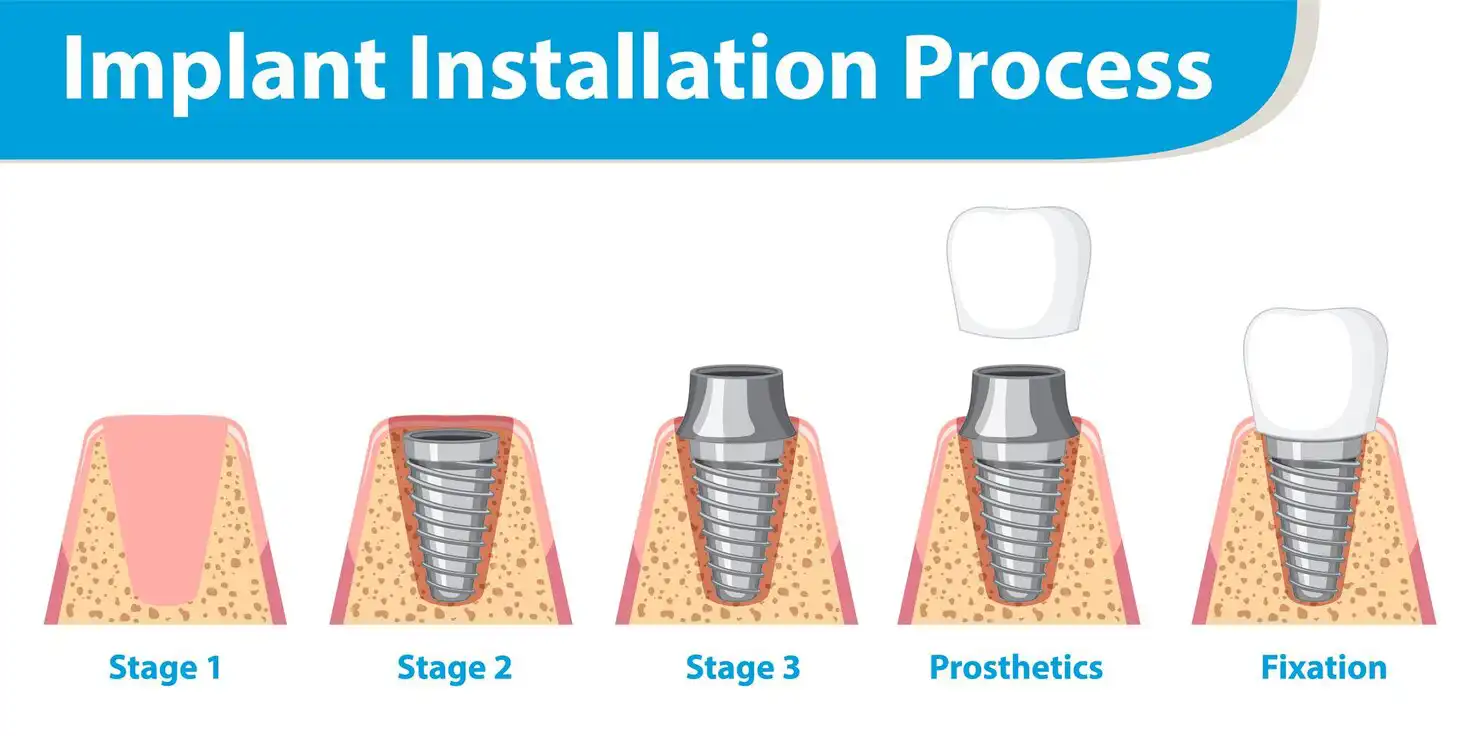Web designing in a powerful way of just not an only professions. We have tendency to believe the idea that smart looking .
At Green Village Medical, we offer world-class dental implant treatments to restore your smile with permanent, natural-looking results. Whether you’re missing a single tooth or require full mouth reconstruction, our implant solutions provide the strength, stability, and aesthetics of natural teeth—improving both function and confidence.
Dental implants are titanium posts surgically inserted into the jawbone to replace missing tooth roots. They serve as a strong foundation for fixed crowns, bridges, or dentures. Implants preserve bone structure, maintain facial shape, and function just like real teeth.
| Natural Look & Feel | Designed to look, feel, and function like your own teeth |
| Long-Term Durability | With proper care, implants can last a lifetime |
| Bone Preservation | Prevents jawbone deterioration often caused by tooth loss |
| No Impact on Neighboring Teeth | Unlike bridges, implants do not compromise adjacent healthy teeth |
Schedule a free dental implant consultation at Green Village Medical and explore a lasting solution for missing teeth.

A dental implant is a titanium post that acts as an artificial tooth root, supporting crowns, bridges, or dentures.
Patients with good oral health, sufficient bone density, and no uncontrolled health conditions are ideal candidates.
With proper care and hygiene, dental implants can last a lifetime.
The procedure is performed under local anesthesia and is typically no more uncomfortable than a tooth extraction.
Initial healing takes 1–2 weeks, but full integration with the bone (osseointegration) may take 3–6 months.
In some cases, yes. Immediate implants are possible depending on bone quality and absence of infection.
Success rates are over 95% with proper technique, planning, and post-operative care.
Yes. The visible crown is custom-made to match your natural teeth in shape, color, and size.
Yes, they are a well-established, safe, and long-lasting treatment with decades of clinical data.
Bone grafting may be recommended to rebuild the jaw and create a strong foundation for the implant.
Brush and floss daily, attend regular dental checkups, and maintain a healthy lifestyle for long-term success.
Usually 2–3 visits: one for surgery, one for check-up, and another for placing the final crown after healing.
Yes, once healing is complete, you can enjoy most foods just like with natural teeth.
We offer all-inclusive packages starting from €500 per implant, including consultation, surgery, and prosthetics.
We provide expert care, premium materials, 3D-guided surgery, and international patient support in Istanbul.
Dental implants are titanium posts placed into the jawbone to replace missing teeth. Acting as artificial roots, they support crowns, bridges, or dentures and provide a natural-looking, long-lasting solution for tooth loss.
At Green Village Medical, we use biocompatible materials like titanium and zirconia for implant treatments. These materials are highly durable, integrating with the bone for long-term stability. With proper care, dental implants can last a lifetime.

The cost of dental implants at Green Village Medical varies based on the implant type, treatment complexity, and individual dental needs. Our team provides personalized pricing after a thorough consultation.
We offer transparent, competitive pricing and use the latest technology to ensure long-lasting results. Contact us to learn more about current implant costs and available treatment packages.


Dental implants have revolutionized the field of dentistry, offering a long-lasting and natural-looking solution for replacing missing teeth. Understanding the types of implant available is crucial when considering dental implant treatment. In this article, we delve into the different types of dental implants and their unique characteristics.
Endosteal implants are the most common type of dental implant. These implants are typically made of titanium and are surgically placed directly into the jawbone. They provide a strong and stable foundation for artificial teeth, resembling the root structure of natural teeth. Endosteal implants are ideal for patients with sufficient bone density and are the preferred choice for many dental implant procedures.
Subperiosteal implants are an alternative option for patients with inadequate bone density or who are unable to undergo bone grafting. Unlike endosteal implants, subperiosteal implants are placed on top of the jawbone, beneath the gum tissue. Custom-made metal frameworks are designed to fit the contours of the jawbone, allowing for the attachment of artificial teeth. Subperiosteal implants offer a viable solution for individuals who may not be suitable candidates for traditional implant techniques.
All-on-4 implants, also known as full arch implants, are designed to restore an entire arch of missing teeth using only four strategically placed implants. This innovative technique maximizes the use of available bone and eliminates the need for individual implants for each missing tooth. All-on-4 implants provide a cost-effective and efficient solution for patients seeking full-mouth rehabilitation.
Zygomatic implants are utilized in cases where traditional implants cannot be placed due to severe bone loss in the upper jaw. These implants are anchored in the cheekbone (zygoma) and provide a stable foundation for dental restorations.

Dental implants have transformed the field of restorative dentistry, offering a multitude of benefits for individuals seeking to replace missing teeth. In this article, we explore the extraordinary benefits of implants and how they can enhance both oral health and overall well-being.
One of the key benefits of implants is their ability to restore optimal oral functionality. Unlike traditional dentures or bridges, implants provide a stable and secure foundation for artificial teeth. They allow individuals to bite, chew, and speak naturally, without the worry of slippage or discomfort.
Dental implants provide a natural-looking and aesthetically pleasing solution for tooth replacement. The implants are designed to integrate seamlessly with the surrounding teeth, ensuring a harmonious and confident smile. With their ability to replicate the appearance of natural teeth, implants can significantly improve self-esteem and boost overall confidence.
When a tooth is lost, the underlying jawbone may begin to deteriorate due to lack of stimulation. Dental implants act as substitutes for tooth roots and stimulate the jawbone, preventing bone loss and preserving overall jawbone health. This preserves the facial structure and prevents the sunken appearance often associated with missing teeth.
Dental implants are known for their durability and longevity. With proper care and regular dental check-ups, implants can last a lifetime. Unlike other tooth replacement options that may require frequent repairs or replacements, implants provide a reliable and long-lasting solution.
Dental implants have revolutionized the field of restorative dentistry, providing a reliable and long-lasting solution for tooth replacement. While the benefits of implants are significant, it is essential to be aware of the potential side effects of implants. In this article, we delve into these side effects to help individuals make informed decisions about their oral health.
Regular dental check-ups, proper oral hygiene, and following post-operative instructions are vital in minimizing the risk of side effects and maximizing the success of dental implant treatment.
The placement of dental implants involves a surgical procedure, and like any surgical intervention, there are inherent risks involved. These risks may include infection, bleeding, nerve damage, or damage to surrounding structures. However, these risks are minimal and can be mitigated with the expertise of a skilled oral surgeon.
Following the implant placement surgery, individuals may experience some temporary discomfort, such as swelling, bruising, or mild pain. These symptoms are typically managed with prescribed pain medications and gradually subside as the healing process progresses.
While rare, there is a slight risk of implant failure, where the implant does not integrate properly with the jawbone. Factors that can contribute to implant failure include poor oral hygiene, smoking, uncontrolled diabetes, or certain medical conditions. Regular dental check-ups and proper oral care can greatly reduce the risk of implant failure.
In rare cases, individuals may experience allergic reactions to the materials used in dental implants, such as titanium or ceramic. It is crucial to inform your dentist of any known allergies or sensitivities before undergoing the implant procedure.
The choice between an implant vs bridge depends on various factors such as oral health, bone density, adjacent teeth condition, and personal preferences. Consulting with a dental professional is essential to evaluate your specific case and determine the best treatment plan.
Good oral hygiene practices are crucial for implant maintenance. Brush your teeth at least twice a day using a soft-bristle toothbrush and a non-abrasive toothpaste. Pay extra attention to the implant area, brushing gently to avoid damaging the gum tissue. Floss daily to remove plaque and debris from between the teeth and around the implant.
Visit your dentist regularly for professional cleanings and check-ups. Your dentist will examine your dental implants, assess their stability, and address any potential issues at an early stage. Professional cleanings will remove any plaque or tartar buildup that can compromise the health of your implants.
Tobacco use, including smoking and chewing tobacco, can negatively impact the success of your dental implants. These habits can increase the risk of implant failure and complications. Quitting or avoiding tobacco products altogether will benefit both your oral health and the longevity of your implants.
Maintaining a healthy lifestyle contributes to overall oral health. Eat a balanced diet, rich in fruits, vegetables, and lean proteins, to provide essential nutrients for gum and bone health. Limit sugary and acidic foods that can contribute to tooth decay and gum disease.
While implant complications can occur, they are generally infrequent and can often be prevented with proper oral hygiene and regular dental care. It is essential to work closely with a qualified dental professional who will assess your individual case, provide appropriate treatment, and guide you in maintaining optimal oral health. By understanding potential complications and following recommended care guidelines, you can enjoy the long-lasting benefits of dental implants with peace of mind.


The lifespan of dental implants can vary depending on various factors, including dental implant maintenance, overall oral health, and individual circumstances. However, with proper care and maintenance, dental implants have the potential to last a lifetime.
Dental implants are a safe and reliable solution for tooth replacement. They have been extensively studied and are considered a standard of care in modern dentistry.
It is essential to note that the majority of implant procedures are successful, and the occurrence of complications is relatively low. Dentists with expertise in implantology and comprehensive aftercare instructions can greatly minimize these risks, ensuring a positive and successful outcome for patients seeking dental implants.
The cost of dental implants can vary depending on several factors, including: Number of Implants, Implant Material, Additional Procedures, Geographical Location, Dentist's Expertise.
there are situations where the need to remove or replace an implant may arise: Complications or Failure, Implant Upgrades, Changing Oral Health Needs.
The length of the recovery period after implant can vary depending on various factors, such as the number of implants placed, your overall health, and the quality of your bone. Regular follow-up visits with your dental professional will allow them to monitor your progress and ensure a successful recovery.
By taking the time to evaluate these factors, you can make an informed decision and ensure the best possible outcome for your oral health: Oral Health, Bone Density, Overall Health, Smoking, Budget

